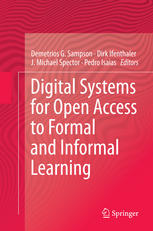

Most ebook files are in PDF format, so you can easily read them using various software such as Foxit Reader or directly on the Google Chrome browser.
Some ebook files are released by publishers in other formats such as .awz, .mobi, .epub, .fb2, etc. You may need to install specific software to read these formats on mobile/PC, such as Calibre.
Please read the tutorial at this link: https://ebookbell.com/faq
We offer FREE conversion to the popular formats you request; however, this may take some time. Therefore, right after payment, please email us, and we will try to provide the service as quickly as possible.
For some exceptional file formats or broken links (if any), please refrain from opening any disputes. Instead, email us first, and we will try to assist within a maximum of 6 hours.
EbookBell Team

4.8
14 reviewsToday, Digital Systems and Services for Technology Supported Learning and Education are recognized as the key drivers to transform the way that individuals, groups and organizations “learn” and the way to “assess learning” in 21st Century. These transformations influence: Objectives - moving from acquiring new “knowledge” to developing new and relevant “competences”; Methods – moving from “classroom” based teaching to “context-aware” personalized learning; and Assessment – moving from “life-long” degrees and certifications to “on-demand” and “in-context” accreditation of qualifications. Within this context, promoting Open Access to Formal and Informal Learning, is currently a key issue in the public discourse and the global dialogue on Education, including Massive Open Online Courses (MOOCs) and Flipped School Classrooms.
This volume on Digital Systems for Open Access to Formal and Informal Learning contributes to the international dialogue between researchers, technologists, practitioners and policy makers in Technology Supported Education and Learning. It addresses emerging issues related with both theory and practice, as well as, methods and technologies that can support Open Access to Formal and Informal Learning. In the twenty chapters contributed by international experts who are actively shaping the future of Educational Technology around the world, topics such as:
- The evolution of University Open Courses in Transforming Learning
- Supporting Open Access to Teaching and Learning of People with Disabilities
- Assessing Student Learning in Online Courses- Digital Game-based Learning for School Education
- Open Access to Virtual and Remote Labs for STEM Education
- Teachers’ and Schools’ ICT Competence Profiling
- Web-Based Education and Innovative Leadership in a K-12 International School Setting
are presented.
An in-depth blueprint of the promise, potential, and imminent future of the field, Digital Systems for Open Access to Formal and Informal Learning is necessary reading for researchers and practitioners, as well as, undergraduate and postgraduate students, in educational technology.